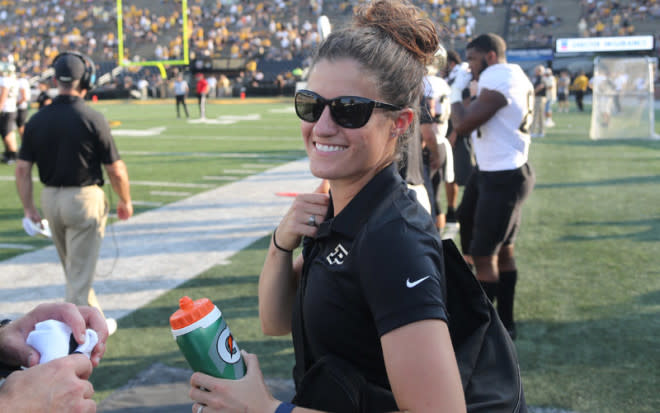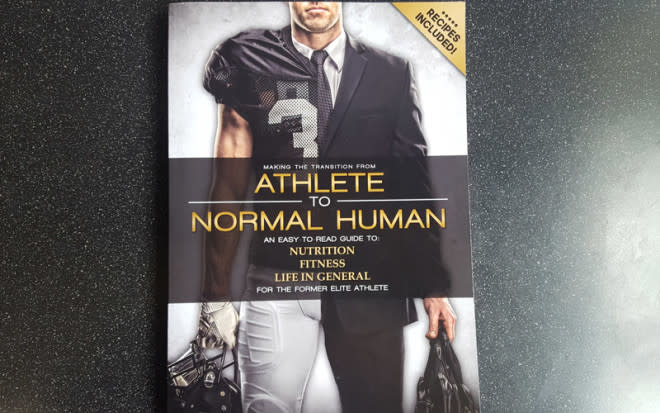Purdue's Blast program helping athletes adjust to life after sports

Tom Campbell
At the end of 2016 soccer season, Christa Szalach realized she had to make several changes before she graduated the following spring.
No longer was the midfielder playing two 90-minute games a week, plus practicing four other days. Nor did she have the comfort of being part of a team, with its instant camaraderie and friendship of those shared experiences. And she was soon going to have to hit the real world, where she’d have to manage her own finances and make other professional decisions.
Luckily for her, Szalach is one of eight in the spring of 2017 who graduated from Purdue’s Blast program, a series of workshops and activities designed to help outgoing Boilermaker athletes get ready for life after sports. Now in its third year, the program has about 25 juniors and seniors enrolled.
“I think that Purdue is kind of ahead of the game in implementing a program like this,” said Szalach, a May graduate who now works in marketing in the Arizona State athletic department. “Hopefully coaches will begin to see the positive of it. I think they already do, it’s just so new that it’s not being enforced, you could say.
“But I think everyone sees the value in it and it’s about teaching the student-athletes to see the value as well, so they’re not looking at it as, ‘Oh shoot, I have to do more work on top of my athletics on top of my school work,’ but rather, ‘Hey, I’m at least getting a jumpstart on a future career and things I’m going to be faced with.’”
Blast — Boiler Life After Sport — focuses on four areas of athlete wellness: Nutrition and fitness; professional development; financial literacy; and health and wellness (identity). It was the brainchild of Lauren Link, Purdue’s Director of Sports Nutrition, and Leadership Advisor Cathy Wright-Eger, along with other members of Purdue’s academic services department.
For Link, a former Purdue soccer player and the author of the book “Making the transition from Athlete to Normal Human,” it’s about preparing athletes for a future without the rigors of daily sports training. It can be critical to the long-term health of an athlete, like a football offensive lineman who might suddenly go from needing 7,000 calories per day to half that many, at most. It’s an adjustment, to say the least, especially now days when food is so readily available during the season.
Football team members, for instance, have training table five days a week, plus get $30 weekly for their Moocho app — the money can be used at Link-approved restaurants like Fresh City Market, Jimmy Johns or Subway (to name a few) — fuel stations (where they could get a bagel and a drink for breakfast) and have team-provided meals on game-days.
That means, Link points out, that players could go their whole careers without learning to grocery shop, cook or make healthy choices on their own.
“I had seen my former teammates go through similar stuff, where it’s like, ‘How do I do this? I’ve never had to work out by myself. I’ve never had to figure out my calorie intake. How many calories do I need now?’” Link said. “I had seen that from the nutrition side and thought, ‘Man, we should really do more with this. It would be great if we could have a program or whatever.’ We have a program leading in, EDPS, a class that our freshmen athletes take. It addresses life skills to help transition into being an athlete and being ready for college, so on and so forth. To me, I was like what if we could have the same thing going out?”
Athletes go through several workshops as part of the program, including a budgeting workshop held by Purdue Federal Credit Union, a job fair, and an exercise class not associated with Purdue. They meet with Jan Metzinger, Purdue’s human resources director, to learn more about choosing the right health benefits packages at their new jobs.
Szalach, a Naperville, Ill., native, had interest in many areas of the program, from the financial impact of post-graduate life, to the idea of living in a totally new environment. She’d known of a former Purdue soccer player who moved to the Northwest after graduation and struggled with feeling she’d lost her identity.
Nutrition was also important, Szalach said, because she’d been so used to her exercise and diet routine.
“For me personally it was a struggle,” she said. “I met with Lauren multiple times after my soccer career to figure out, ‘OK, I don’t need any post-workout shakes any more because the type of muscle that I’m keeping is completely different than what I had been doing.’ It is a change and it took me maybe three months or so to get into a routine and multiple meetings with Lauren. So the Blast program, and focusing on that, is a big thing. I think a lot of athletes don’t realize it until your season is done.”

Link’s experience at Purdue, both as a soccer player (2007-11) and the sports nutritionist, led her to writing the book, published this summer. After graduation in 2011, Link blogged about her transition from athlete to “normal human” and felt she was filling a void for others in her situation. And that feeling continued when Blast was initiated at Purdue.
The book includes tips on burning calories, muscle loss, cooking, grocery shopping, proper hydration and much more, with interspersed tales from other athletes. Link wanted to help them adjust.
“At some point, having lived it and seeing how much people struggle with it, and you run in to people who played another sport and they say, ‘Oh my gosh Lauren, I’ve gained 100 pounds. Help.’ Or, ‘I lost all my muscle because I don’t work out like I did and I don’t like it,’” she said. “You run in to all sort of people in the spectrum and I thought, there’s really not a resource for this.
“When we started doing Blast, we actually looked for resources to guide them in each category and I could not find anything for nutrition, that’s really specific to that. So I was like, ‘Why not?’ I could do that. The research we did for the Blast program pushed me to say, ‘Well, I’m going to do that.’”

Membership Info: Sign up for GoldandBlack.com now | Why join? | Questions?
Follow GoldandBlack.com: Twitter | Facebook
More: Gold and Black Illustrated/Gold and Black Express | Subscribe to our podcast
Copyright, Boilers, Inc. 2017. All Rights Reserved. Reproducing or using editorial or graphical content, in whole or in part, without permission, is strictly prohibited.

